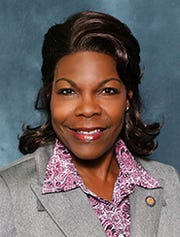A
creditor
must seek payment of unpaid bills from a deceased spouse’s estate
before attempting to collect payment from the surviving spouse, the
Ohio Supreme Court ruled today.
The Supreme Court ruled 5-2 that a southwest Ohio nursing home
was required to file a claim with the estate of Robert Bell before it
could pursue payment for his care from his widow, under Ohio’s
“necessaries
statute.”
Writing for the Court majority, Justice Judith L. French explained the necessaries statute,
R.C. 3103.03,
directs a spouse to care for the other if the spouse is unable to do
so. Because the nursing home did not attempt to find out if Robert
Bell, through his estate, was able to pay the bill, it could not pursue
Cora Sue Bell for payment.
Chief Justice Maureen O’Connor and Justices Terrence O’Donnell,
Sharon L. Kennedy, and Mary DeGenaro joined Justice French’s opinion.
In a
dissenting opinion,
Justice Patrick DeWine wrote that the plain language of the
necessaries statute does not require that a creditor first pursue
payment from the spouse’s estate.
Justice Patrick F. Fischer also dissented without a written opinion.
Spouse Dies, Bill Arrives
In January 2014, Robert Bell entered into an admission agreement
with Embassy Healthcare (doing business as Carlisle Manor Healthcare)
that stated he was “responsible for all amounts due and owing the
facility” for his stay at Carlisle Manor in Warren County. Cora Bell
signed as the “responsible party.” However, nothing in the agreement
made her “in any way personally liable for payment for services
rendered” by the nursing home, the agreement stated
Robert Bell died in 2014. On Nov. 25, 2014, six months and three
days after his death, Embassy sent a notice that it was seeking $1,678
from his estate. Included in the notice to Cora Bell was that she was
not personally liable for the account. As of Nov. 22, no estate had
been opened for Robert Bell, and Embassy did not seek to have an estate
administrator appointed within six months of his death for the purpose
of presenting a claim for unpaid services.
In June 2015, Embassy filed a
complaint
in Franklin Municipal Court in Warren County against Cora Bell seeking
payment for her husband’s unpaid expenses, invoking the necessaries
statute.
Bell asked the court for
summary judgment,
arguing that Embassy could not prove her husband was unable to pay the
bill and that the nursing home failed to file a claim within the
six-month
statute of limitations in Ohio’s estate claims law,
R.C. 2117.06. The
magistrate hearing the case ruled in Bell’s favor, finding that Embassy failed to offer any
evidence that Robert Bell or his estate could not pay for the services.
A Warren County Common Pleas Court judge also sided with Bell,
but for different reasons than the magistrate. The trial court found
Embassy failed to present the claim to Robert Bell’s estate within the
six-month deadline.
Embassy
appealed the decision to the Twelfth District Court of Appeals. A divided Twelfth District
reversed
the decision, finding that a claim can be pursued against a spouse
independently from making a claim against the estate. Bell appealed the
decision to the Supreme Court, which agreed to hear the case.
Court Examines Statutes
Justice French explained the Court had to examine the interplay
between the estate claim and the necessaries statute. The opinion noted
the necessaries law developed over time and has its origins in the
common law
necessaries doctrine. That doctrine required a husband to be liable
for any necessaries, such as food, clothing, shelter, or medical
services that was provided to his wife. It stemmed from the need to
provide essential items and services to neglected wives.
The latest version of Ohio’s statute extended the responsibility
to both spouses and requires “each married person” to support
themselves, and if a married person is unable to do so, the spouse must
assist in the support “as far as the spouse is able,” the opinion
noted.
The majority opinion stated that Robert Bell retained primary
responsibility for his unpaid bill and that Embassy must seek to
collect payment from his income and assets. R.C. 3103.03(A) states that
a married person is responsible for supporting oneself and only “if”
the spouse is unable, must the other spouse assist in support.
“The nondebtor spouse becomes liable only if the debtor spouse
does not have the assets to pay for his or her necessaries,” the
opinion stated. “A creditor must therefore first seek satisfaction of
its claim from the assets of the spouse who incurred the debt.”
The Court majority noted the agreement with Embassy and Bell’s
husband stated he was responsible for the debt and as the responsible
party she was not personally liable. The Court concluded that Embassy
was required to first seek payment from the estate before pursuing
Bell.
Wife Can Be Pursued if No Estate Assets
Embassy could prevail under the necessaries statute if it can
show that Bell’s husband’s estate was not able to pay the bill, the
opinion stated. The Court disagreed with Embassy’s argument that it
could independently seek payment from both the estate and the spouse to
cover the outstanding bill.
The opinion stated that the estate law requires all creditors, including claims arising out of
contract,
must be presented under the terms in R.C. 2117.06. The Court found
Embassy’s claims arose from its contract with Robert Bell and his
obligations became the obligations of his estate when he died.
The Court noted Embassy wrote to Bell informing her that it
would seek payment from the estate. However, Embassy never sought to
open an estate. The opinion indicated that if no estate has been
opened, the creditor is required to seek the appointment of an estate
administrator so that a claim can be filed within the six-month
deadline. Embassy did not do that, the opinion stated.
“Because Embassy sat on its rights, its claims arising from
Robert’s obligations under the admission agreement is forever barred
‘as to all parties’ including Cora,” the Court concluded.
The Court reversed the Twelfth District’s decision and
affirmed the trial court decision in favor of Cora Bell.
Dissent Says Necessaries Can Be Pursued
In his dissent, Justice DeWine maintained the majority created a
“broad new rule” subjecting those seeking payment for necessaries to
estate-law requirements. He wrote the necessaries statute contains no
such requirements.
Justice DeWine explained that under the necessaries statute,
Embassy had to prove Robert Bell was unable to pay and that one way to
show this would be by making a claim against his estate and finding
there were insufficient funds to pay the bill. But, he wrote, the
inability to pay could be shown in other ways. For example, the creditor
might be able to compile records that establish the person died
without assets and there would be no payment by filing a claim against
the estate.
The dissent noted it would be a “vain act” for a service
provider to wait for an estate to be opened to a file a claim when the
provider knows the person has no assets and also knows the surviving
spouse is capable of paying. The dissent cautioned that the majority
ruling would subject other creditor actions to the requirements of R.C.
2117.06, not only those that arise under the necessaries statute. The
dissent would affirm the Twelfth District’s opinion.
2017-1031.
Embassy Healthcare v. Bell,
Slip Opinion No. 2018-Ohio-4912.
 View oral argument video of this case
View oral argument video of this case.
Please note: Opinion
summaries are prepared by the Office of Public Information for the
general public and news media. Opinion summaries are not prepared for
every opinion, but only for noteworthy cases. Opinion summaries are not
to be considered as official headnotes or syllabi of court opinions.
The full text of this and other court opinions are available online.
Full Article & Source:
Nursing Home Barred from Seeking Outstanding Bill Payment from Surviving Spouse


















